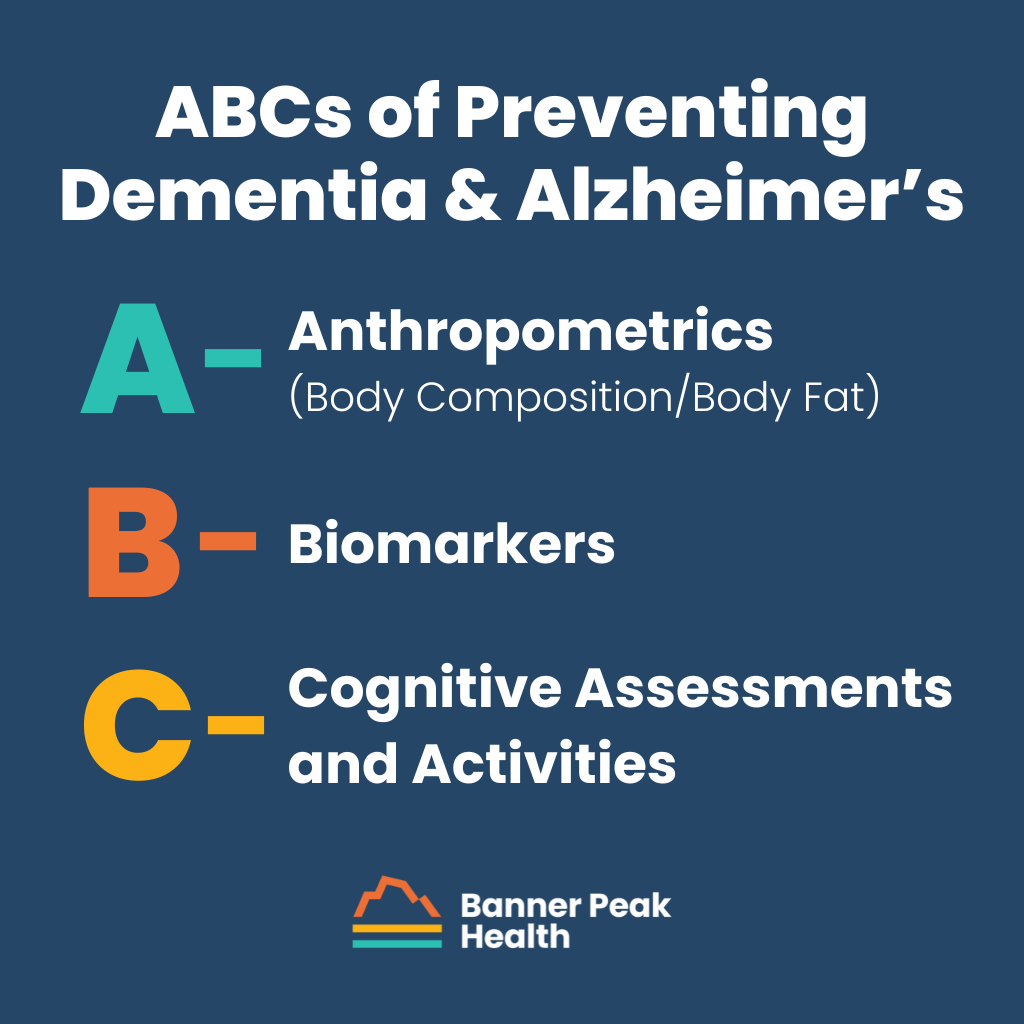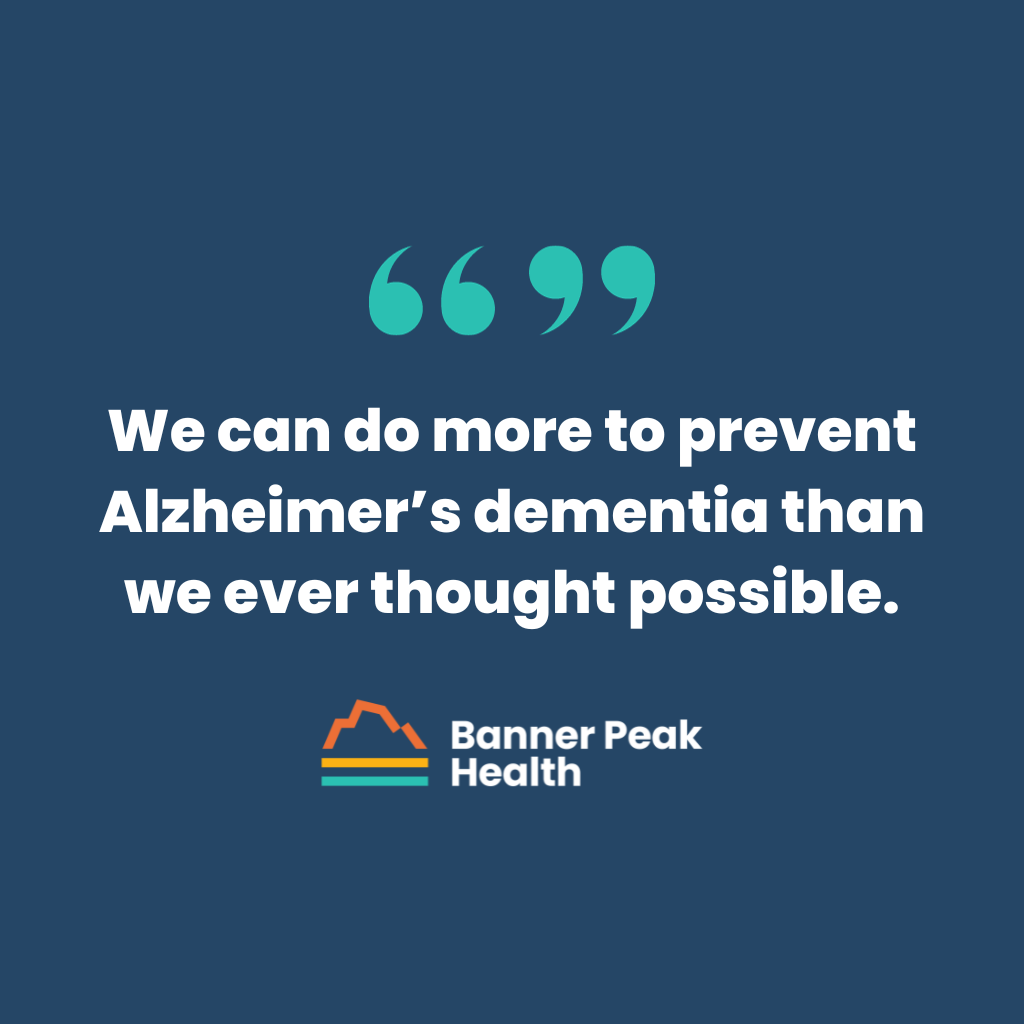Many people still believe dementia and Alzheimer’s are genetic diseases beyond our control. That’s not the case anymore. We can do more to prevent these issues than we ever thought possible.
More than six million Americans have Alzheimer’s, and we expect that number to double by the year 2050. Additionally, an estimated 47 million Americans are in the pre-clinical stages of Alzheimer’s disease but have yet to experience any noticeable symptoms.
These pre-clinical stages involve changes in the brain that occur 20–30 years before signs of mild cognitive impairment (like saying “I can’t find my keys” and then finding them in the fridge, etc.).
Currently, researchers are trying to define stage one of Alzheimer’s, which is challenging because it’s subclinical (meaning people who don’t have symptoms are at risk). Stage two is mild cognitive impairment, and stage three is dementia/Alzheimer’s.
Published dementia/Alzheimer’s research focuses on stage three, but we’ve seen very few benefits from the billions of dollars spent. Although Big Pharma would love to make a mint from selling a “silver bullet” for Alzheimer’s, success remains elusive. The drugs on the market offer little relief to patients.
As in most things, we at Banner Peak Health take the road less traveled and prefer an approach focused on how to prevent dementia and Alzheimer’s pre-onset. Fortunately, science is catching up.
How to Prevent (or Delay) Dementia and Alzheimer’s
One-third of Alzheimer’s cases are preventable. We can delay the onset of, or improve, the remaining two-thirds, which we hope to do until we find a “silver bullet.” Unfortunately, a minority group will be diagnosed with Alzheimer’s regardless of their efforts.
Doctors like Richard Isaacson lead the way, but prevention isn’t as attractive as finding a cure. Because prevention relies mainly on lifestyle changes, there’s no product to sell and no money to make (unlike with a miracle pill).
Lifestyle changes are also difficult to track and isolate. However, through precision medicine, we’ve noticed certain impactful markers. Let’s review the ABCs of how to prevent dementia and Alzheimer’s.

A: Anthropometrics (Body Composition/Body Fat)
We’ve found that the waistline is inversely related to the size of the hippocampus (the part of the brain related to memory). So, as your belly grows, your hippocampus shrinks, damaging your memory.
To optimize your capacity for memory as you age, engage in more cardiovascular and fat-burning exercise. HIIT (high-intensity interval training) burns fat, and studies have demonstrated a relationship between HIIT and memory.
B: Biomarkers
Biological markers, or biomarkers, serve as early warning signs of poor health. These include:
- Cholesterol
- Nutritional markers
- Homocysteine — high levels are injurious to the brain
- B vitamins — cofactors to reactions that help the brain
- Metabolic syndrome
- Blood sugar
- Blood pressure — the SPRINT study demonstrated that patients with lower BP have less cognitive decline
- Lipids/ApoB — should be as low as possible to make sure there are no vascular issues
- Insulin resistance in brain cells — it’s suspected that brain insulin resistance may cause or contribute to Alzheimer’s, unofficially termed “type 3 diabetes”
All these factors are within your control. Discuss each with your doctor and decide which are of most concern for you and how to best optimize your health.
The APOE Gene
You get one copy of the APOE gene from each parent. This gene has different types: APOE e2, APOE e3, and APOE e4.
- APOE e2 may protect against Alzheimer’s disease, and about 5–10% of the population has it.
- APOE e3, the most common variety of this gene, doesn’t affect Alzheimer’s disease.
- APOE e4 increases the risk of Alzheimer’s disease and is associated with early onset. If you have two of these genes, one from each parent, your risk for Alzheimer’s increases 8x–12x (2–5% of the population).
Knowing your risk is essential; you can find out through genetic testing. The more you know, the more intentional you can be about specific strategies on how to prevent dementia and Alzheimer’s.
C: Cognitive Assessments and Activities
Neuro-psych tests take about three hours to complete and cover short-term memory, long-term memory, spatial abilities, language ability, and fluency. Each subset of the test examines different parts of the brain for dysfunction.
After the test, you may be asked to take it again to gauge whether you can improve or reverse some cognitive impairment. You may receive some cognitive exercises to practice beforehand.
Activities like learning a new language, learning a new instrument, or learning how to ride a bike can have tremendous cognitive benefits. Regularly challenge yourself with puzzles or games, and engage in new activities.

How to Prevent Dementia and Alzheimer’s: Your Plan
Each person’s prevention plan is different, but tracking the anthropometrics listed above is essential for everyone. Monitor them and work with your doctor to outline a strategy that works for you. Proactively working to prevent dementia and Alzheimer’s is reliant on precision medicine and open, honest communication.

Waheeda Hiller, MD
For over 20 years in Internal Medicine, Dr. Hiller has dedicated herself to providing unparalleled care to patients. She joined Banner Peak Health in 2023 as a concierge physician to better serve patients with the depth of thought, knowledge, and compassionate care they need to live the healthiest lives possible.



